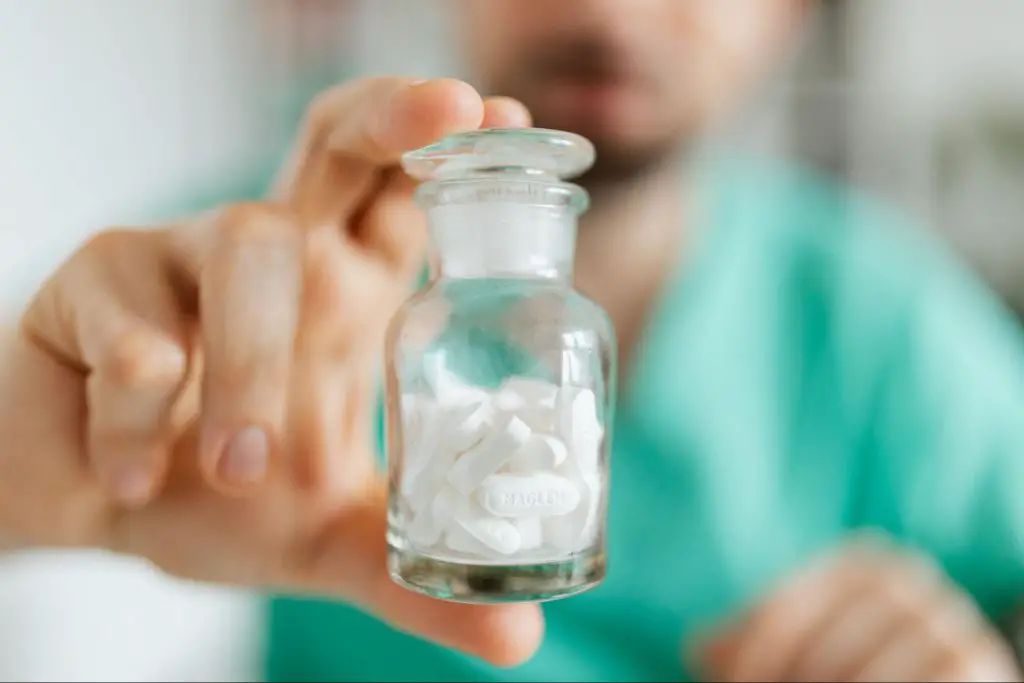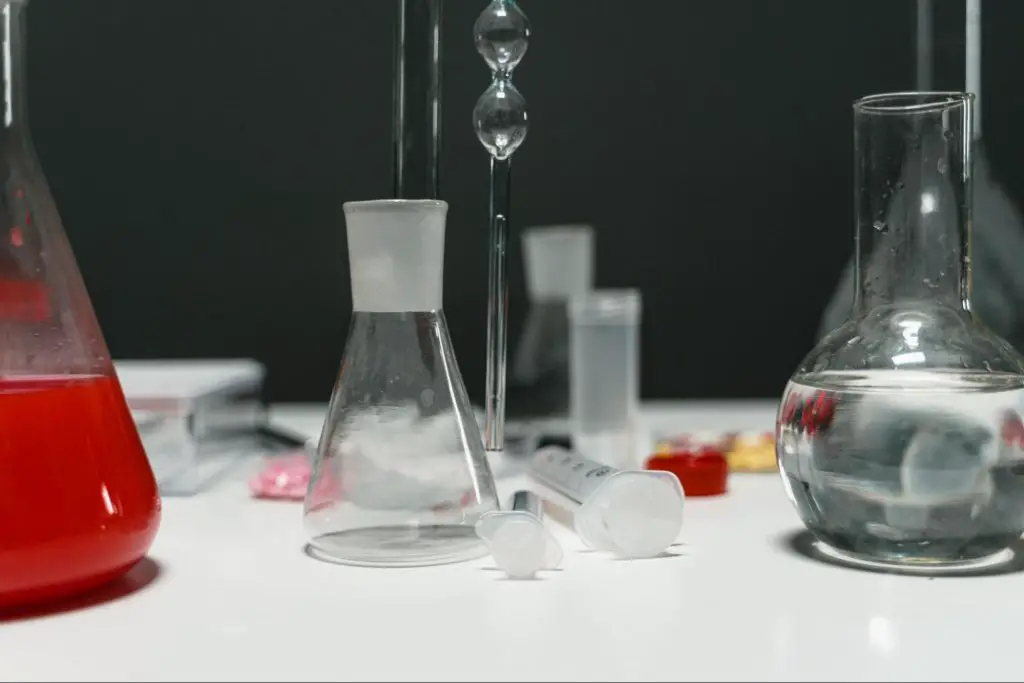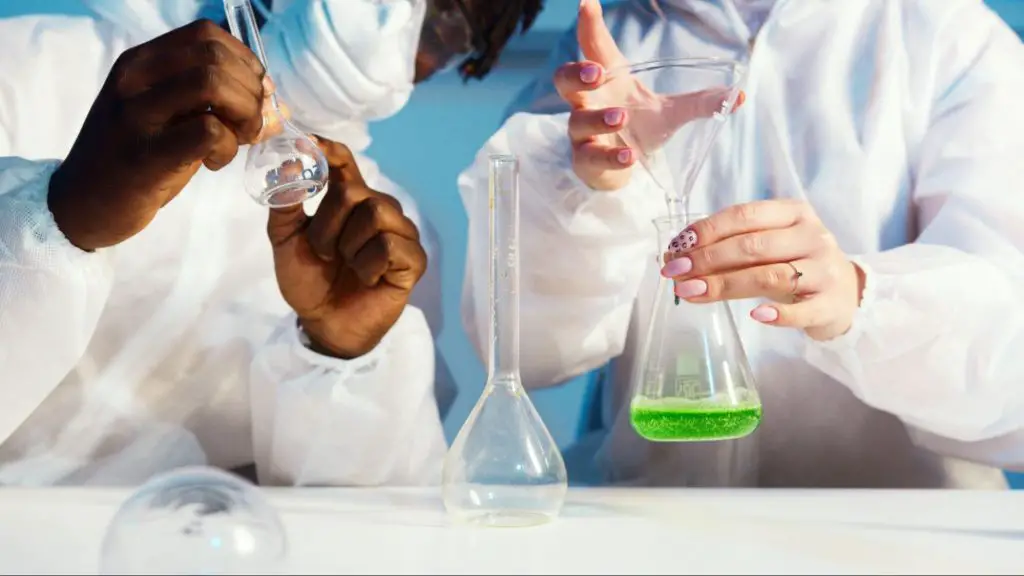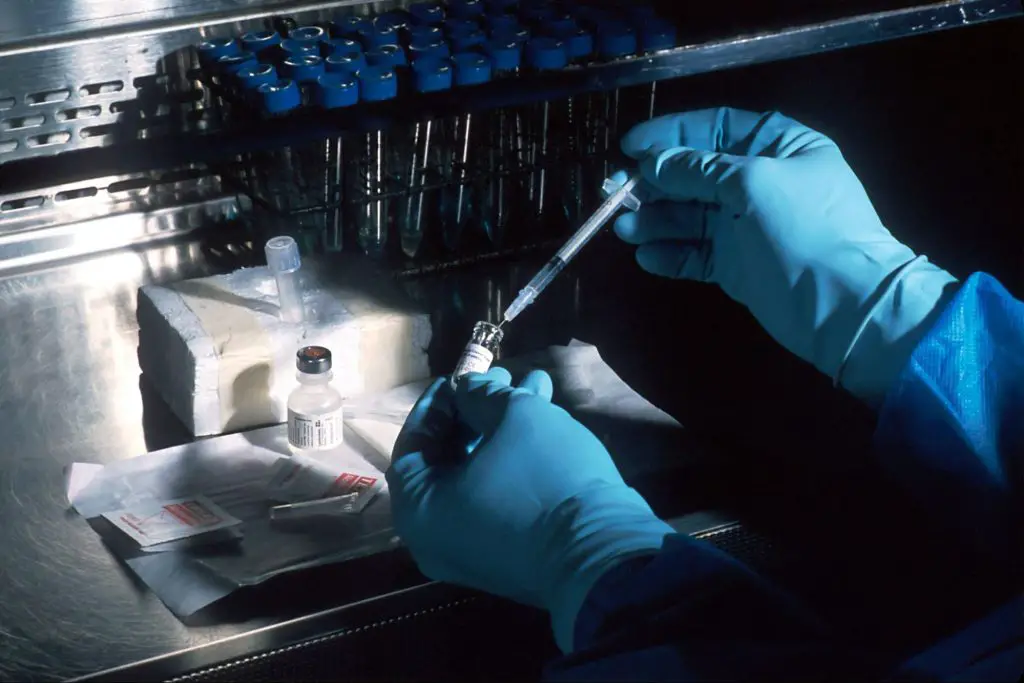We used the latest data and insights to identify the Highest Paying Pharmaceutical Jobs so that you can learn and earn more.
Jobs in the pharmaceutical industry can be highly competitive. But if you have the expertise that most employers look for, you are in a better position to land a well-paying pharmaceutical job.
Our findings have been derived from the US Bureau of Labor Statistics, career platforms, and other major sources. We hope you find this information useful as you plan your career.
Let’s take a look!
Here is a video summary based on this article
Similar Articles:
- 10 Highest Paying Astronomy Jobs to Consider
- 10 Highest Paying Psychology Jobs to Consider
- 10 Highest Paying Physics Jobs to Consider
Table of Contents
#10. Pharmaceutical Process Technician
How much do they get paid?
- Source: Glassdoor
- Low Range: $15,000 per year
- High Range: $282,000 per year
- Median Pay: $65,902 per year

What do they do?
Pharmaceutical process technicians work in labs and manufacturing plants to help create new medications. They also ensure that the quality of the products meets or exceeds the company’s standards.
What degrees and skills are usually required?
Employers prefer a bachelor’s degree in chemistry, but some will accept an associate’s degree in chemistry or biology if you have experience working with chemicals in lab settings. A high school diploma is also acceptable if you have extensive experience working with chemicals on an industrial scale (at least three years).
Who’s hiring for these jobs?
Pharmaceutical process technicians work in hospitals, clinics, and other drug manufacturing or storage facilities. They may also work in research facilities that produce new drugs or vaccines.
What’s the best way to get this job?
If you want to become a process technician, you’ll need at least some college-level education. You’ll also need good communication skills—you’ll be working with people daily.
The quickest way to get this job is by networking with people who already work in the field or finding an internship at a local company before applying for full-time positions.
20 Best Software For Molecular Modeling And Simulations In Academia
What’s it like to be a pharmaceutical process technician?
#9. Quality Control Chemists
How much do they get paid?
- Source: Comparably
- Low Range: $41,110 per year
- High Range: $125,450 per year
- Median Pay: $71,260 per year

What do they do?
Quality control chemists work in the pharmaceutical industry to ensure that medications are safe and effective for consumers. They conduct pharmaceutical trials to meet specific purity, color, smell, and taste standards.
These specialists also review medical samples from raw materials all the way through production and distribution to ensure that there are no contamination issues or deviations in quality from standards set by regulations.
What degrees and skills are usually required?
A bachelor’s degree in chemistry is an essential requirement for this position. However, many employers prefer candidates with an advanced degree in chemistry or biology. In addition to having a strong educational background, you must have attention to detail and excellent communication skills to work well with others.
You might also like:
- 10 Highest Paying Chemistry Jobs to Consider 2023
- 10 Highest Paying Immunology Jobs to Consider 2023
- 10 Highest Paying Biochemistry Jobs You Might Not Know
- 10 Highest Paying Pharmacist Jobs 2023
- 10 Highest Paying Genetics Jobs You Might Not Know
Who’s hiring for these jobs?
These quality control chemists work in pharmaceutical labs and research facilities, where they use various tools to test drugs for impurities and contaminants.
What’s the best way to get this job?
You can become a quality control chemist by taking courses in chemistry at a college or university level and then applying for an internship at your local pharmaceutical company. After gaining experience in this area, you can move up within the company or find another position with similar responsibilities elsewhere.
What’s it like to be a quality control chemist?
#8. Regulatory Specialist
How much do they get paid?
- Source: Glassdoor
- Low Range: $26,000 per year
- High Range: $208,000 per year
- Median Pay: $73,708 per year

What do they do?
Regulatory specialists are responsible for ensuring that their companies comply with all government regulations, including environmental, safety, and health laws. They also help to create new rules and policies that govern their businesses.
What degrees and skills are usually required?
You need at least a bachelor’s degree in business administration or a related field (like public policy) to get this job. You’ll also need specialized knowledge of specific industries like food safety or drug development. Finally, having experience working with regulatory bodies will help too—either through internships or volunteer work.
Who’s hiring for these jobs?
Regulatory specialists work in various industries, including healthcare, manufacturing, retail, consumer goods companies, and more.
What’s the best way to get this job?
With your education, you can get this job through networking:
- Attend industry events where you might meet potential employers face-to-face.
- Join professional associations where you can meet others who work in the same field.
- Volunteer your time at non-profit organizations that focus on issues relevant to your job search.
What’s it like to be a regulatory specialist?
You might also like:
- 10 Highest Paying Chemical Engineering Jobs To Consider
- 10 Highest Paying Immunology Jobs To Consider
- 10 Highest Paying Biochemistry Jobs You Might Not Know
- 10 Highest Paying Chemistry Jobs To Consider
- 10 Highest Paying Genetics Jobs You Might Not Know
#7. Biostatistician
How much do they get paid?
- Source: Payscale
- Low Range: $60,000 per year
- High Range: $117,000 per year
- Median Pay: $77,571 per year

What do they do?
A biostatistician is a data analyst who works with scientific data to make decisions. They are responsible for analyzing data from medical studies, often working with health care providers or pharmaceutical companies to design studies that can help improve patient outcomes. This means that biostatisticians work closely with doctors, nurses, and sometimes even patients.
What degrees and skills are usually required?
To become a biostatistician, you need at least an undergraduate degree in biostatistics or statistics (or another relevant field). You may also require additional education after completing your undergraduate degree.
The skills needed for this job include quantitative skills (calculus and statistics), problem-solving skills, communication skills, strong writing ability, and creativity.
Who’s hiring for these jobs?
Biostatisticians work in medical research, pharmaceuticals, universities, finance, and public health.
What’s the best way to get this job?
After earning your degree, you can get this job by:
- Looking for employment at research labs or pharmaceutical companies that have openings for biostatisticians.
- Going back to school if necessary.
- Networking with people who have jobs in the field.
You might also like:
- 10 Highest Paying Jobs For Biotechnology Majors To Consider
- 10 Highest Paying Immunology Jobs to Consider
- 10 Highest Paying Genetics Jobs You Might Not Know
- 10 Highest Paying Microbiology Jobs to Consider
- 10 Highest Paying Biochemistry Jobs You Might Not Know
What’s it like to be a statistician?
#6. Biotechnology Consultants
How much do they get paid?
- Source: Glassdoor
- Low Range: $37,000 per year
- High Range: $177,000 per year
- Median Pay: $78,914 per year

What do they do?
Biotechnology consultants are medical professionals who work with clients to develop new products, improve existing products, and evaluate the effectiveness of those products. These consultants provide companies with information about the latest technology and medical devices to help them develop new products.
What degrees and skills are usually required?
They must have a bachelor’s degree in biology, chemistry, or another relevant science, such as biotechnology. They must also have at least three years of experience working as scientists or researchers.
Skills that most employers look for include:
- Problem-solving skills.
- Creativity.
- Time management skills.
- Communication skills.
- Project management skills.
Who’s hiring for these jobs?
Biotechnology consultants can work for biotech companies or other organizations with an interest in biotechnology. They may also work for government agencies or universities.
What’s the best way to get this job?
The quickest way to get this job is by getting a degree in science or engineering from a university or college with strong biotechnology programs. You can then apply for internships at biotechnology companies during school or after graduation.
You might also like:
- 10 Highest Paying Immunology Jobs to Consider
- 10 Highest Paying Biochemistry Jobs You Might Not Know
- 10 Highest Paying Jobs For Biotechnology Majors To Consider
- 10 Highest Paying Chemistry Jobs to Consider
- 10 Highest Paying Pharmacist Jobs
What’s it like to be a biotech consultant?
#5. Pharmaceutical Financial Analyst
How much do they get paid?
- Source: ZipRecruiter
- Low Range: $28,000 per year
- High Range: $143,500 per year
- Median Pay: $85,814 per year

What do they do?
A pharmaceutical financial analyst analyzes the financial data of pharmaceutical companies.
They are in charge of calculating the revenue and costs associated with pharmaceutical products. They then use this information to help determine how much a drug is worth and how much it will cost to produce.
What degrees and skills are usually required?
The job requires a bachelor’s degree in finance as well as an understanding of accounting and economics.
Most employers prefer candidates with relevant work experience.
Who’s hiring for these jobs?
Pharmaceutical financial analysts can work anywhere, from large corporations to smaller businesses that focus on specific markets. They can also work for government agencies.
What’s the best way to get this job?
You can become a pharmaceutical financial analyst by earning a degree in economics, accounting, or finance. You should network with people who work in the industry to get job alerts.
What’s it like to be a financial analyst?
#4. Pharmaceutical Manager
How much do they get paid?
- Source: Glassdoor
- Low Range: $34,000 per year
- High Range: $233,000 per year
- Median Pay: $87,411 per year

What do they do?
A pharmaceutical manager is responsible for ensuring that all pharmaceuticals manufactured by their company are safe to use and effective in treating whatever they’re intended to treat. They also manage the people who work on and with the product, which means they have to understand how each part of the process works—from manufacturing to distribution—to identify areas where improvement would be helpful.
What degrees and skills are usually required?
To become a pharmaceutical manager, you’ll need to earn at least a bachelor’s degree. Some companies will require an advanced degree as well. You’ll also need to have experience working in this field or other related areas, such as marketing or sales.
Who’s hiring for these jobs?
Pharmaceutical managers work at pharmaceutical companies and medical research facilities.
What’s the best way to get this job?
The fastest way to get this job is by getting an education from an accredited university or college program. You can then apply for internships in your field of study during your undergraduate studies or after graduation. This program will help you build up more experience before applying for jobs within pharma management.
What’s it like to be a pharmaceutical manager?
You might also like:
- 10 Highest Paying Immunology Jobs To Consider
- 10 Highest Paying Biochemistry Jobs You Might Not Know
- 10 Highest Paying Pharmacist Jobs
- 10 Highest Paying Jobs For Biotechnology Majors To Consider
- 10 Highest Paying Microbiology Jobs To Consider
#3. Pharmaceutical Sales Representative
How much do they get paid?
- Source: ZipRecruiter
- Low Range: $30,000 per year
- High Range: $134,500 per year
- Median Pay: $91,977 per year

What do they do?
Pharmaceutical sales representatives sell drugs and other medical products directly to doctors and hospitals. They also educate medical professionals who want more information about different medicines to provide better customer care.
What degrees and skills are usually required?
The most common degree for this job is a bachelor’s degree in marketing or business administration focusing on sales. It’s also helpful if you’ve had some experience working either as a sales associate or in retail.
Some companies offer training programs for new hires to learn more about the products they will be selling.
Who’s hiring for these jobs?
Pharmaceutical sales representatives work in hospitals, doctor’s offices, nursing homes, drugstores, and pharmacies.
What’s the best way to get this job?
The first step to getting this job is by earning a degree in marketing or communications. You should also have the ability to talk about your product clearly, without getting bogged down in technical terms.
What’s it like to be a pharmaceutical sales representative?
#2. Pharmaceutical Research Scientist
How much do they get paid?
- Source: Glassdoor
- Low Range: $42,000 per year
- High Range: $255,000 per year
- Median Pay: $100,992 per year

What do they do?
Pharmaceutical research scientists are responsible for conducting biomedical research on pharmaceuticals and drugs. They execute clinical trials to study the effects of a drug on animals and humans. Their work can include creating or modifying a molecule to testing it on cells, tissues, or whole organisms—such as mice or other animals.
What degrees and skills are usually required?
This job needs at least a master’s degree in chemistry or biology. A Ph.D. is usually required for more advanced positions. Some companies will hire people with bachelor’s degrees, but usually only if they are already experienced researchers.
Pharmaceutical research scientists also need excellent problem-solving skills, creativity, and a solid understanding of pharmacology.
Who’s hiring for these jobs?
These research scientists work in laboratories at universities, hospitals, or pharma companies. They may also work in manufacturing facilities to help create new drugs and then test them before they are released onto the market.
What’s the best way to get this job?
One way of getting this job is by going through an internship program at a pharmaceutical company or government agency. Then, starting with entry-level work as a lab assistant before moving up into more specialized roles as time goes on.
What’s it like to be a research scientist?
#1. Medical Science Liaisons
How much do they get paid?
- Source: Payscale
- Low Range: $100,000 per year
- High Range: $173,000 per year
- Median Pay: $140,043 per year

What do they do?
Medical science liaisons work with both doctors and patients to help them understand the latest developments in medicine and how to apply this information in practice.
They’re responsible for bridging the gap between research and practice, ensuring that the two work together to solve real-world problems.
What degrees and skills are usually required?
To become a medical science liaison, you must have a college degree in biology or chemistry with at least two years of experience working directly with pharmaceuticals or another healthcare-related field. You should also be able to communicate clearly and effectively with people from different backgrounds.
Who’s hiring for these jobs?
They can work in many settings—hospitals, clinics, research labs—but many find themselves working in academia or for large pharmaceutical companies.
What’s the best way to get this job?
You need at least an undergraduate degree in biology or chemistry—but you may enroll in an advanced degree program as well. in these fields.
You can start by working in entry-level positions before climbing the ladder to the high-paying jobs in this field.
What’s it like to be a medical science liaison?
Similar Articles:
- 10 Highest Paying IT Jobs to Consider
- 10 Highest Paying Programming Jobs to Consider
- 10 Highest Paying Forensic Science Jobs to Consider
Conclusion
With all of this being said, the pharmaceutical industry constantly needs qualified and talented individuals. While the pay might not be a top priority for some people, it is still important to remember that there are many opportunities for advancement within this industry.
As you can see, there is worth a wealth of information in this field. It can be quite stressful depending on which area you specialize in. We hope this article has been helpful to you.
We wish you all the best in getting a high-paying job in the pharmaceutical industry.



Greetings Madam I would like do know if how can I get the collective videos and infomation organized so that i can perfom a career guidance for my matric learners and other FET learners because I found this very interestiand if possible help me with tt of univer